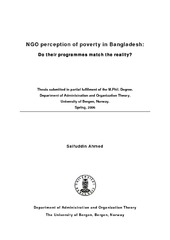NGO perception of poverty in Bangladesh: Do their programmes match the reality?
Master thesis
Permanent lenke
https://hdl.handle.net/1956/1473Utgivelsesdato
2006Metadata
Vis full innførselSamlinger
- Department of Government [457]
Sammendrag
This study is conducted assuming that the NGOs poverty perception and poverty reduction programmes do not match with the real causes of poverty of their beneficiaries. The unrealistic programmes of the NGOs in Bangladesh can not contribute to poverty reduction. Micro-credit (MC) and Water and Sanitation (WatSan) programmes of Dustha Shasthya Kendro (Health Centre for the Poor)-DSK and Micro-credit and Governance & Human Rights (G&HR) of Jagroto Jubo Shongho (Juvenile Youth Centre)-JJS have respectively been selected for empirical data. The beneficiaries and the policy level people of these NGOs and programmes have covered in focus group method interview and thus to collect data. The focus group questionnaire was administered under the guidance of variables and the theoretical framework. The main aim of this study is to find out the answer of the questions: How do the NGOs in Bangladesh, conceive the term poverty? And how do the NGOs select poverty reduction programme?The variation, selection, retention and struggle process of evolutionary, ecological and institutional approach of Howard E Aldrich is used in this research. More over, the poverty discourse is also used to get the answer of the research question. The reviewed literature shows how JJS and DSK have changed their strategy as well as programmes. What are the factors which influence JJS and DSK to select programmes? By the name of the resource constrain and survive in the population ecology, the funding agencies play a key role to select NGOs’ poverty reduction programmes rather to consider reality of the programme field. The programmes are influenced either by internal or by external factors or by internal and external factors. This is an unrealistic way of programme selection. The empirical data and information shows that JJS and DSK’s selected programmes do not match with the causes of poverty of the programmes’ areas.
Utgiver
The University of BergenOpphavsrett
The authorCopyright the author. All rights reserved
